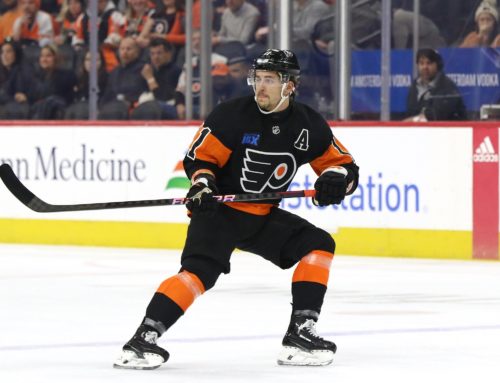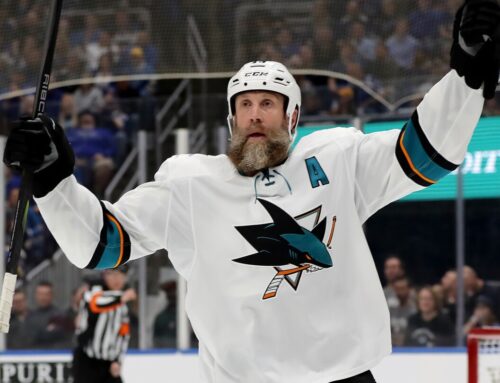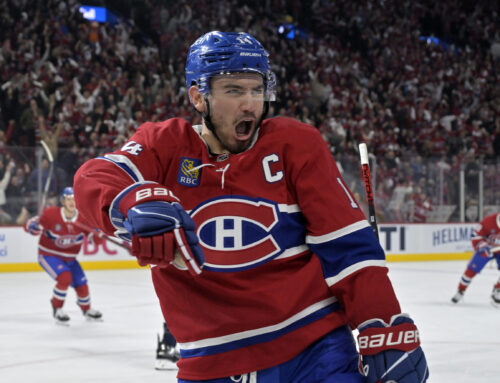
This Cup Final is one that has something for everyone. The expansion team from a non-traditional market where the fans have showed up from Game One of the regular season and made it *their* team and the team that was perennial contenders only to always flame out. Loads of skill on both sides bundled with pace that a casual fan can enjoy. Literally something for everyone.
Also, there was a trebuchet. The pre-game ceremony had an actual trebuchet, for the non-hockey fan who’s also a medieval weapons professor. This whole thing was nuts in the most awesome kind of way:
Vegas sure knows how to put on a show! 🤩 pic.twitter.com/v2uGfgJ7r8
— NHL on NBC (@NHLonNBCSports) May 29, 2018
The actual game lived up to the hype. Vegas carried the play early though we had a 2-2 score through 20 minutes. A goal from Colin Miller was replied by both Nicklas Backstrom and Brett Connolly, only to be replied in kind by William Karlsson. Reilly Smith made it 3-2 Vegas early in the second period and that top line for Vegas, as it has most of the year, was absolutely flying. An equalizer from John Carlson came about five minutes after the Smith goal and we were knotted at three through two. That goal, by the way, was courtesy of this sublime pass from TJ Oshie:
That's some slick passing on @JohnCarlson74's tying goal. pic.twitter.com/3Hk67tWYfR
— NHL GIFs (@NHLGIFs) May 29, 2018
Stop me if you've heard it before, but Tom Wilson laid a dirty hit. In the middle of the third period, Marchessault chipped the puck in and well after the puck was gone, Wilson came in and went shoulder to shoulder with him. It was a blatant interference that forced Marchessault to go through concussion protocol. We'll see if the DoPS comes up with anything here, but considering Wilson has three suspensions *this season* it's pretty hard to give him any benefit of the doubt or a reason to go easy on him.
Third-period goals from Nosek and Reaves (honestly) gave the Golden Knights the lead that they would hold to the end of the game. It was such a great game from the start. We can only hope we get six more of these.
*
Gary Bettman had his State of the League address and aside from the usual nonsense, we got a sort-of timeframe for the Seattle expansion vote. It should come by the end of this calendar year or early the following year.
*
Aleksi Heponiemi appears to be heading for Finland.
The second-round Florida pick from 2017 has absolutely shredded the WHL over the last two seasons to the tune of 204 points in 129 games. At the age of 19, he has nothing left to do in Junior. The move to Finland would get him a year playing at a very high level of men’s hockey at which time he would presumably find his way to the Panthers roster. I’m sure dynasty owners were hoping he would be in the lineup for 2018-19 but it appears they’ll have to wait another season.
You can read Heopniemi’s Dobber Prospects profile here.
*
A heartbreaking piece from Helene St. James in the Detroit Free Press yesterday. It was about Johan Franzen’s recovery, or lack thereof, from post-concussion issues. Most of it is from Franzen’s wife Cissi and it details just how little his condition has improved over the last three years. It appears things are progressing now with new treatment but it’s still heartbreaking. I encourage everybody to read it and for those that think players should just suck it up after suffering a concussion, keep this story in mind.
*
A fellow hockey writer – shout out to JayWilly – was discussing with myself and others as to why the Caps had been so much better in the postseason than the regular season. Keep in mind that during the regular season this Caps team was in the bottom-third of the NHL in adjusted shot share at five-on-five, just ahead of Arizona. Those types of teams don’t usually make the playoffs, and if they do, they don’t last very long. They certainly don’t head to the Cup Final. Through three rounds, they’re over a 51 percent adjusted shot share. JayWilly surmised maybe it’s some additions they made like Michal Kempny. That certainly didn’t hurt. One thing that shouldn’t be overlooked: Lars Eller has been otherworldly in the postseason.
Washington’s bottom-six forward mix was a problem all year for the Caps. Their top two lines were pretty good and their bottom two lines were mostly bad; no line combination in the bottom-6 that had at least 60 minutes together cracked even 49 percent adjusted shot share at five-on-five, let alone 50 percent or better. The third line of Eller-Connolly-Burakovsky was absolutely buried to the tune of 38.6 percent adjusted goal share. You’d expect that from a line of AHLers, not a line of established NHLers. Beagle-Stephenson-DSP was similarly crushed at 41.9 percent shot share and 47.1 percent expected goal share. We’ve seen top-heavy teams in the past get to the playoffs (the Pittsburgh teams from early this decade come to mind) but they usually don’t get to this position.
Whatever happened, Eller has been a monster since Game 1 against Columbus. The line of Eller-DSP-Connolly has had a 53.9 percent adjusted shot share and 51.3 percent expected goal share. Remember when Backstrom was injured and Eller had to move up to the second line? The trio of he, Jakub Vrana, and TJ Oshie were at 58.8 percent shot share combination and 58.4 percent expected goals. In total, Eller has been on the ice for a 53.2 percent shot share in the playoffs compared to 48 percent in the regular season. It’s night and day.
Should the Caps win the Cup, there’s no chance that Eller wins the Conn Smythe. There are too many other worthy players that play more minutes at the top of the lineup. The significant improvement of Eller and that third line, though, is a big reason why Washington finds itself in the Final.
*
Last week I posted a Ramblings on new baseline production we should be expecting from forwards and defencemen in fantasy hockey. Over the last month or so a lot of time has been dedicated to changing trends in the NHL over the last few years that really came to the forefront in 2017-18. We saw rising shot and goal rates at five-on-five, rising power play efficiency, fewer PP minutes allocated to defencemen, more five-on-five goals from defencemen, changes in shot share from different positions, and more. You can read all about these trends in our Ramblings archive starting in April.
To continue the discussion started on Friday, it’s time to look at changes in shots, blocked shots, and penalty minutes.
As far as penalty minutes are concerned, I will direct you to an article Dobber writer Cam Metz wrote earlier this month on sustainability of penalty minutes. It was part of Eastern Edge so only half(ish) of the league was covered but it is an interesting approach and worthwhile read.
For this, we will be using the same parameters that we used for the section on goals, assists, and shots: 12-team leagues, 22-man rosters with 19 skaters consisting of 10 starting forwards, 5 starting defencemen, 3 bench forwards, and 1 bench defenceman. That means the top-156 forwards and top-72 defencemen.
Let’s started with blocked shots and, as usual, all data from Natural Stat Trick.
Blocked Shots
With the rise in shot totals, we would expect a somewhat proportional rise in shot-blocking totals, right? Well we did. Sort of.
What was curious is that shot-blocking from defencemen really didn’t see a jump, at least not among the top-72 totals that we are using in this sample. In fact, the average fantasy-relevant defenceman in shot-blocking saw a tiny decline from 2016-17 to 2017-18 (though for all intents and purposes, there’s been basically no change):

Where there has been a change is among the forwards. Fantasy hockey owners don’t typically consider blocked shots when drafting forwards or scouring the waiver wire. For good reason, too, as just three forwards had at least 80 blocked shots in 2017-18 compared to 136 defencemen. It’s just the nature of the positions. However, the increase in shot-blocking, at least among the top-end forwards, is noticeable:

In 2017-18, all forwards blocked 14 887 shots compared to 13 395 in 2015-16. That represents an increase of 11.14 percent in blocked shots among forwards over the last two seasons. In 2017-18, all defencemen blocked 22 541 shots compared to 21 383 in 2015-16. That represents an increase of 5.42 percent among defencemen over the last two seasons. There are more blocked shots for everybody as shot rates go up but the increased rate at which forwards are blocking shots is more than double that of defencemen.
One thing to note about the forwards: while the average has gone up, the standard deviation has gone down. To put it simply, there hasn’t been a rise in elite-total shot blockers, just more guys in the middle.
Hits
As with all real-time stats, hits are extremely subjective. They can vary from rink to rink and the literature goes back years as to why it’s a bad stat. Regardless, it’s popular in fantasy hockey so we need to give it a look.
There is less hitting in the league compared to even two years ago, at least among the forwards. There were just under 2900 fewer hits registered by forwards in 2017-18 compared to 2015-16. The hit totals among defencemen, though, has gone up slightly as there were about 700 more hits from defencemen in the NHL this year compared to two seasons prior. So while there is less hitting overall now than in 2015-16, the decline in body-checks is all from forwards whereas blue liners are hitting more.

This shouldn’t surprise anyone. The entire hockey world talks about how the game is getting faster, focusing more on possession than dump-and-chase. These things should mean fewer hits from forwards and that’s exactly what we see.
I will forego a graph for defencemen. I will be honest and say I have no idea what’s going on. Average hits went up from 2013-14 to 2014-15, declined over the next two seasons, and are back up this year. There’s no discernible trend to speak of. I will just say that the average fantasy-relevant defenceman put up about 151 hits.
Penalty Minutes
Surprising absolutely no one, penalty minutes have cratered across the league over the last half-decade for everyone. Both forwards and defencemen have seen penalty minute totals decline every year since 2013-14:

There is a lot to unpack here. Fighting is down, so that’s part of it. There are fewer power-play opportunities, which is another part of it. But why are there fewer PP opps? Are players not tripping/slashing/hooking as much? Are they better at hiding it? Are the referees not calling it? That’s something that I’m not sure we can parse out without scouring thousands upon thousands of hours of video.
Regardless, with PIMs plummeting, the top-end contributors are important. That’s why Dustin Byfuglien – even though he didn’t crack 70 games, 200 shots, or double-digit goals for the first time in years – was still basically a top-25 defenceman (league settings depending). Putting up 100 PIMs just doesn’t happen that much anymore so getting totals like that is coveted.
Just so everyone knows: the average fantasy-relevant forward put up 51.9 PIMs in 2017-18 compared to 71.3 in 2013-14. The drop for defencemen has been less precipitous, falling from 65.2 four years ago to 54.2 now.
To sum it all up, targets for fantasy-relevant forwards in 12-team leagues last year were 50 blocked shots, 128 hits, and 52 PIMs. For defencemen, they were 144 blocked shots, 151 hits, and 54 penalty minutes.
Not every player needs to hit those marks, of course. That’s just the average performer at the top of each category. Not every player on those lists will be rostered so those averages aren’t absolute. But it gives fantasy owners an idea of what they need to stay afloat in different categories and how the changing landscape in the NHL is changing the way we should approach valuing contributions from different positions in fantasy hockey.





 VAN
VAN UTA
UTA BUF
BUF NYI
NYI MIN
MIN WSH
WSH FLA
FLA DET
DET
